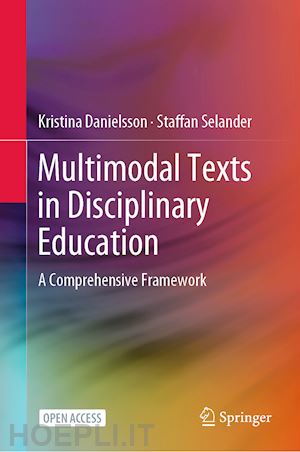
Questo prodotto usufruisce delle SPEDIZIONI GRATIS
selezionando l'opzione Corriere Veloce in fase di ordine.
Pagabile anche con Carta della cultura giovani e del merito, 18App Bonus Cultura e Carta del Docente
This open access book provides an introduction to multimodality and the role of multimodal texts in today’s education. Presenting a comprehensive framework for analysing and working with multimodal texts in disciplinary education, it serves as a tool for researchers and teachers alike. The second part of the book focuses on sample analyses of a variety of educational texts for different age groups and from different disciplines, including games and online resources. The authors also comment on the specific challenges of each text, and how teachers can discuss such texts with their students to enhance both their understanding of the content and their multimodal literacy.
The book is intended for researchers in fields like education and multimodal studies, and for teacher educators, regardless of school subject or age group. With the combined perspectives on text analysis and implications for education, the book addresses the needs of teachers who want to work with multimodalaspects of texts in education in informed ways, but lack the right tools for such work.
Chapter 1. Introduction.- Chapter 2. Multimodal Texts and Literacy in a Digitized World.- Chapter 3. Semiotic Modes and Representations of Knowledge.- Chapter 4. Working with Multimodal Texts in Education.- Chapter 5. Cultivating Students’ Text Creation.- Chapter 6. Close Reading of Multimodal Texts – Sample Analyses.- Chapter 7. Natural Sciences.- Chapter 8. Social Sciences.- Chapter 9. Language.- Chapter 10. Subjects Focusing on Practical Work.- Chapter 11. Mathematics.- Chapter 12. Websites as Learning Resources for Young Learners.- Chapter 13. Educational Games and Online Resources.- Chapter 14. Summary of PART II.
Kristina Danielsson holds a PhD in Scandinavian languages and is currently a Professor of Swedish in Education at Stockholm University, Sweden, and Professor of Swedish at Linnaeus University, Sweden, where she is a member of the boards of the center for Educational Linguistics and the Linnaeus University Center for Intermedial and Multimodal Studies (IMS). In recent years, her main research projects have been in the area of literacy in various school disciplines, with a special focus on multimodality. On behalf of the Swedish Board of Education, she has written numerous articles for teachers’ in-service training and school development concerning reading, writing and text talk in educational contexts. Together with Dr Kok-Sing Tang from Curtin University, she is founding coordinator of the Special Interest Group Languages and Literacies in Science Education, and they are co-editors ofGlobal Developments on Literacy in Science, published by Springer.
StaffanSelander holds a PhD in Education, and he is a Senior Professor of Education at the Department of Computer and Systems Sciences, Stockholm University. A major part of his research during the last ten years has focused on designs for and in learning, knowledge representations and digital learning environments. He has led several external international research projects, and has also been engaged in smaller projects in cooperation with school communities. He is the founder of the journal Designs for Learning. His latest books includeDidaktikenefterVygotskij – Design förlärande (2017); Attblilärare (with Insulander, Eds, 2018); Games and Education – Designs in and for Learning (with Arnseth, Hanghøj, Henriksen, Misfeldt, and Ramberg, Eds, 2018), Dybde//læering – enflerfaglig, relasjonellogskapendetilnærming (with Østern T.P., Dahl, Strømme, Petersen, and Østern A-L, Eds, 2019) and Design förLärande – Historia. Medeltidensomexempel (with Insulander and Lindstrand, Eds, 2019).











Il sito utilizza cookie ed altri strumenti di tracciamento che raccolgono informazioni dal dispositivo dell’utente. Oltre ai cookie tecnici ed analitici aggregati, strettamente necessari per il funzionamento di questo sito web, previo consenso dell’utente possono essere installati cookie di profilazione e marketing e cookie dei social media. Cliccando su “Accetto tutti i cookie” saranno attivate tutte le categorie di cookie. Per accettare solo deterninate categorie di cookie, cliccare invece su “Impostazioni cookie”. Chiudendo il banner o continuando a navigare saranno installati solo cookie tecnici. Per maggiori dettagli, consultare la Cookie Policy.